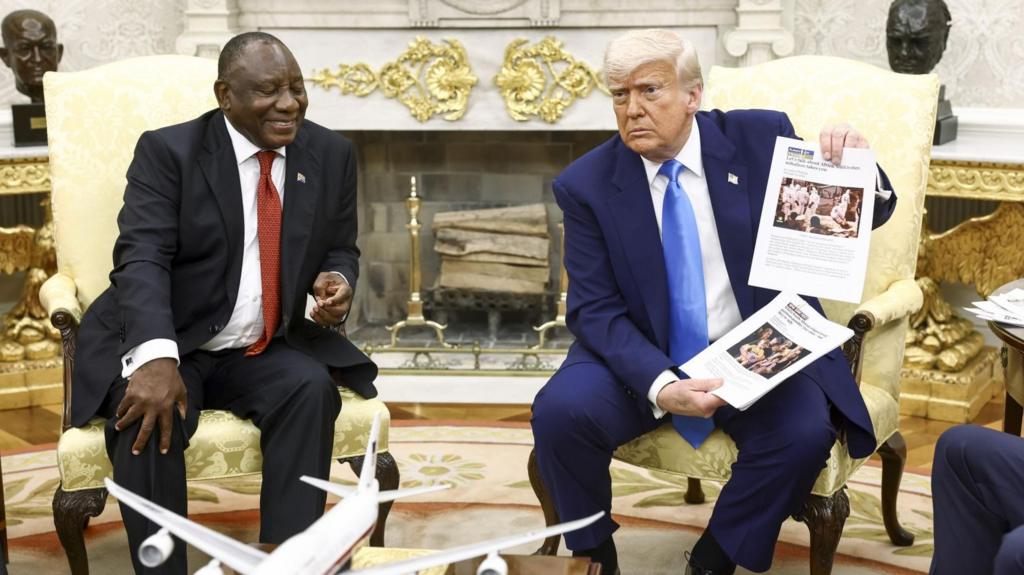South Africans Divided After Trump-Ramaphosa Confrontation
May 22, 2025 – The recent encounter between former President Donald Trump and South African President Cyril Ramaphosa during a meeting at the White House has sparked a wave of reactions among South Africans, highlighting a deep-rooted division within the nation concerning issues of race and governance.
A Choreographed Confrontation
During the meeting, Trump, known for his controversial rhetoric, seized the opportunity to address the struggles of Afrikaner farmers in South Africa, asserting that they are being persecuted. This move was met with adulation from right-wing Afrikaner groups such as the Solidarity Movement, who have actively lobbied the Trump administration, applauding the former president for casting South Africa’s “enormous problems” into the global spotlight.
Prominent Afrikaner right figure Ernst Roets hailed the moment, declaring on social media that “Donald Trump made history today.” Echoing this sentiment, fellow activist Jaco Kleynhans suggested that Trump should be nominated for a Nobel Prize for prioritizing the “farm murder crisis” on an international scale. However, some pundits caution that this rhetoric relies heavily on exaggerations that have permeated the American political conversation.
Ramaphosa’s Calm Response
In stark contrast to Trump’s aggressive stance, President Ramaphosa maintained his composure throughout the interaction, relying on his delegation to provide context pertaining to South Africa’s multifaceted challenges, which include high rates of crime and unemployment affecting people of all races. His approach has garnered respect from many South Africans who viewed his ability to remain calm as a commendable tactic against antagonistic rhetoric.
| Issues Raised | Response from Leaders |
|---|---|
| Persecution of white farmers | Ramaphosa pointed out South Africa’s democracy and the rights of political opposition. |
| High crime rates affecting all races | Agriculture Minister John Steenhuisen acknowledged the need for improved police resources. |
| Economic struggles | Trade union leaders emphasized that the issue is rooted in crime rather than race. |
Dissenting Voices and a Call for Unity
Critics of the right-wing narrative express their frustration at the perceived lack of patriotism among these groups and their decision to draw international attention to the country’s issues. They highlight the efforts made by a coalition government, representing a spectrum of political parties committed to addressing the myriad challenges facing South Africa.
Ramaphosa invoked the legacy of Nelson Mandela, emphasizing national unity against divisive forces such as the Economic Freedom Fighters (EFF), a radical political faction led by Julius Malema. Notably, Malema’s controversial “Shoot the Boer” song was featured during Trump’s presentation, provoking questions about freedom of expression and the complex dynamics of post-apartheid politics.
Conclusion: Moving Forward
As opinions diverge on the implications of the Trump-Ramaphosa interaction, it is evident that South Africa’s political landscape remains a tapestry woven with differing perceptions of race, rights, and governance. The significance of this confrontation lies not only in its immediate outcomes but also in its potential to shape the ongoing discourse about race relations and national identity in South Africa.


